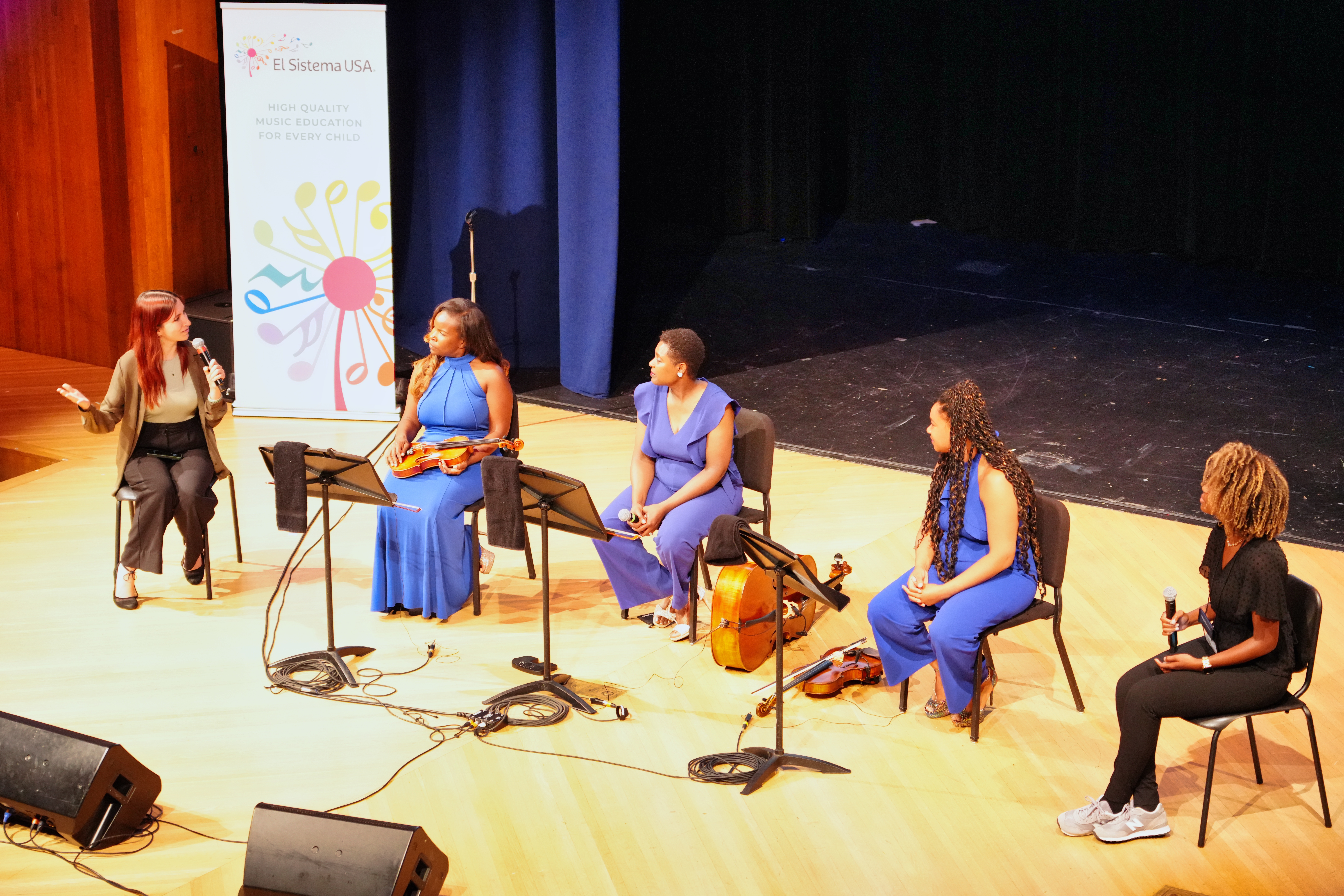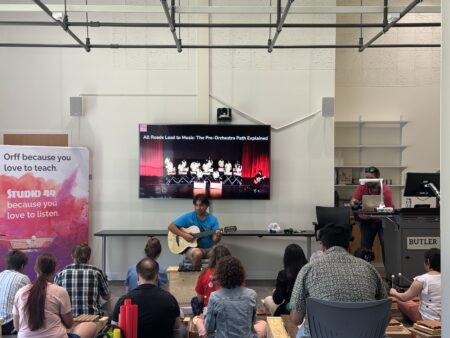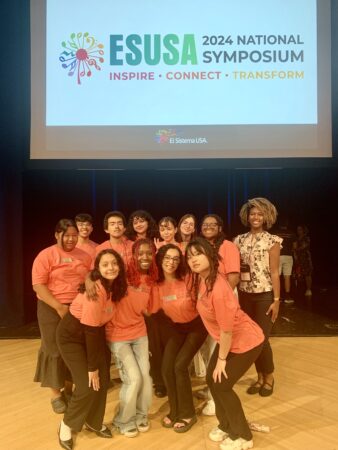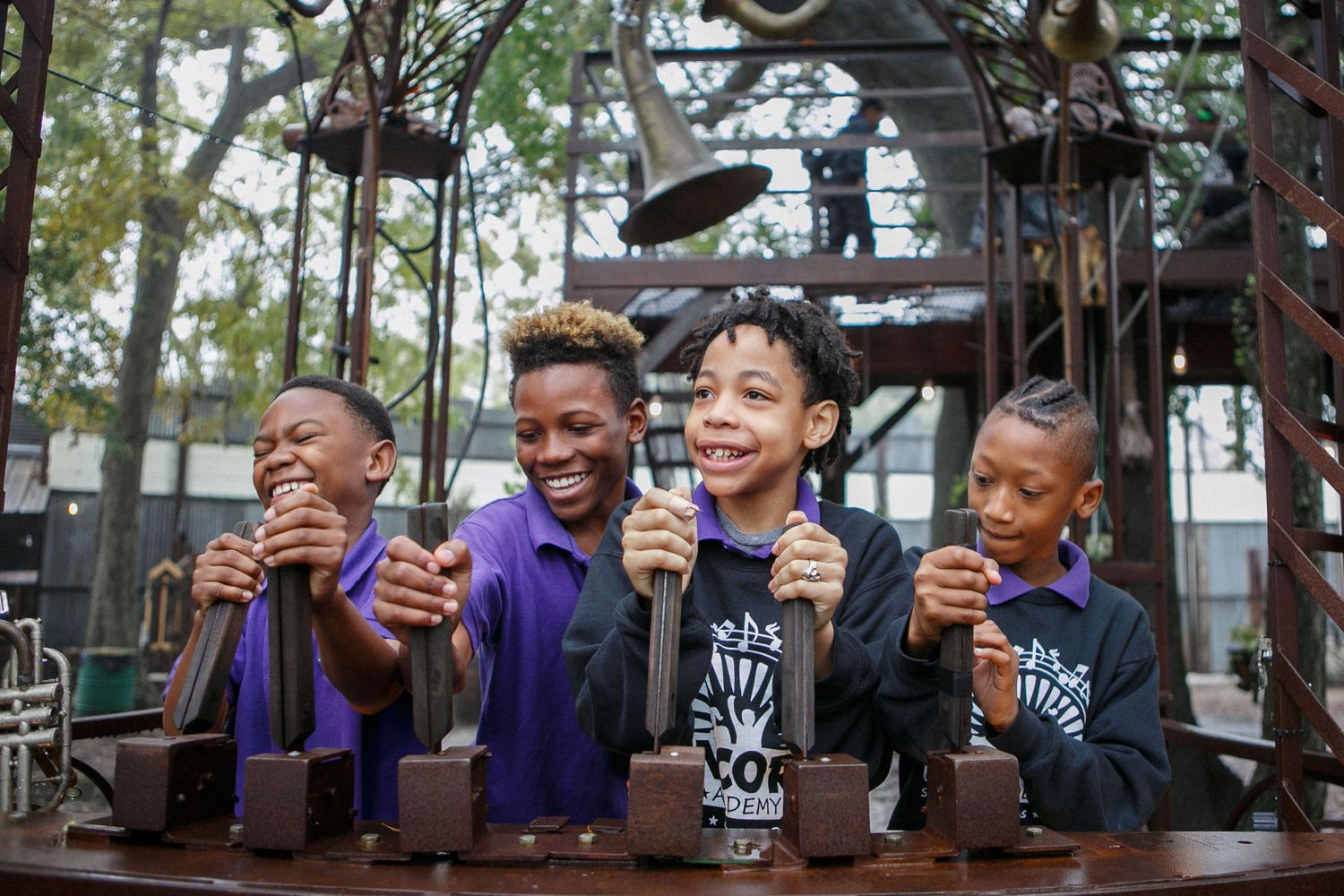
Topics
News & Resources
The El Sistema USA National Symposium: A Report from a First-Timer
Emily Buehler, Manager of Programs and Community Engagement and teaching artist, Paterson Music Project

Youth Leadership Team members Elizabeth Perez-Hickman (left) and Ebonie Pierce (right) interviewing The String Queens. Photo: ESUSA.
As a first-time attendee at the El Sistema USA Symposium, an annual event that brings together people from across the U.S. who are involved in Sistema-inspired work, I didn’t quite know what to expect. But the experience was invaluable. It took place June 13-15, and I am still buzzing with inspiration and excitement about being part of the El Sistema community.
The symposium, held at Butler University in Indianapolis, Indiana, was kicked off by keynote speaker Eric Williamson, who delivered a riveting and inclusive presentation that connected artistry and identity, education and responsiveness, and liberation. He surfaced the realities of being a young person in the world today, including statistics from The Trevor Project National Survey on rates of attempted suicide, anxiety, and depression among young LGBTQ+ people. And he cited a quote from bell hooks’ 1990 essay “Homeplace (A Site of Resistance)”: “The concept of homeplace stresses the importance of community, affirmation, and safety for learning.” This came to feel like the cornerstone of this symposium: the importance of viewing and supporting our students holistically.
All the symposium sessions were interesting and useful. Particularly memorable to me was a presentation on social/emotional learning by The String Queens, three teaching artists who tour as a versatile string trio and are also passionate music educators. From them, we learned tangible techniques such as “Grows and Glows” and the DYAD pedagogy to use with students in and out of the classroom to develop trust, well-being, self-worth, and independence.
A presentation by Project Music’s Gabrielle Molina and Paterson Music Project’s Shanna Lin gave attendees a helpful window into two different program models—and then gave us time to confer with each other about what our programs look like, challenges we face, and solutions we have found.

Conductor/educator Felipe Morales-Torres gave a presentation on “Decolonizing the Classroom,” and one particular idea that stuck with me was this quote by author Emily Good-Perkins: “Children often come to believe that their musical cultures are important only as a bridge to more ‘appropriate’ knowledge.” This resonated with me, because if we are to (in Felipe’s words) “question, reveal, acknowledge, unlearn, rebalance, restore, and reimagine why and how we musick,” we need to make our students’ musical cultures the backbone to music learning, instead of using them only as a tool to “bridge” them to Beethoven, Mozart, and whoever else we think is important. Felipe’s presentation lit a fire under me to reevaluate and analyze how and why we choose the repertoire and settings we do. I accept, and will act on, the challenge Felipe gave us: How can we facilitate valid and validating experiences with cultural musicking?
One of the most powerful aspects of the symposium was the ways in which it centered the ESUSA Youth Ambassadors—ten students from programs all over the country who came together to learn, play, create, and share within the symposium. We had the opportunity to hear them perform their own arrangement of Laufey’s song “Valentine;” they also conducted an interview with El Sistema USA Teacher of the Year Camilo Ortiz about his story, inspirations, and dreams.

On the last day of the symposium, the Youth Ambassadors led a panel discussion focused on the mental health and wellbeing of students. They discussed the importance of checking in and the need for life balance, and they spoke candidly about how depression and anxiety can interact with being a student, especially in music. For program leaders and teaching artists who are building their youth leadership programs, it was inspiring to see this group of capable, energetic, empathic young people in action.
Community-building events such as this symposium are imperative in continuing to build our field. Attendees had the time and space to connect with new colleagues, gather and share information, and ask questions in a safe and supportive environment. In trying to be the best administrators and teachers we can be, we are lifelong learners. And we do our best learning together, from one another.
Related Content
All Regions, Community Building, Editorials, Gather Together, Opinion, Perspectives & Collective Action, Professional Development, Program Design, Student Voice & Leadership, Teaching & Learning, the ensemble
EDITORIAL
Musical Benchmarks Build Equity
Patrick Scafidi
All Regions, Collaborations, Community Building, Events/Performances, Gather Together, News and Resources, North America, Professional Development
New ESUSA Opportunities & Events
Patrick Scafidi
Collaborations, Community Building, Europe, Events/Performances, Funding & Support, Gather Together, Middle East, News and Resources, Professional Development
Funding Opportunity for Arab Artists Based in Europe
Patrick Scafidi
Collaborations, Community Building, Featured, Gather Together, New Orleans, North America, Perspectives & Collective Action, Student Voice & Leadership

The Importance of Free Play in Music Education
Patrick Scafidi



